1. Biscuits grew by 25% in indies and symbols last year
2. The total Everyday Treats sub-sector has grown 27.4% to top £36.8m
3. Biscuits are one of the most common victoms of shrinkflation, say shoppers
4. Healthier Cake is worth £96m across all outlets
5. Premium Treat biscuits have risen 16% in the last year

1. Biscuits grew 25% in indies & symbols last year
In 2024, shoppers will take a little crumb of joy wherever they can find it. And increasingly that happiness is sourced straight from the office treats cupboard.
Biscuit sales rocketed 25% in value and 10% in volume last year (Nielsen), according to Mondelez International, which owns the Belvita, Cadbury and Oreo brands.
The fact biscuits grew by a quarter last year is testament to how much Brits rely on the sweet stuff to get them through the afternoon. The impulse nature of the category means it’s always been a must-stock for c-store retailers. It’s just that since the pandemic, Sue Nithyanandan from Costcutter Epsom in Surrey, says it’s been hard to secure a full range.
“It started during the pandemic when there was a real lack of supply and we were basically just taking whatever we could get our hands on [in cakes and biscuits], you know?” she says.
“The whole category got to be very untidy. I think it’s settling down now but availability has been a problem ever since. Sometimes, for example, we’ve been able to get the price-marked Rich Tea packs and sometimes we haven’t. That can be a problem when customers are looking hard at the price.”
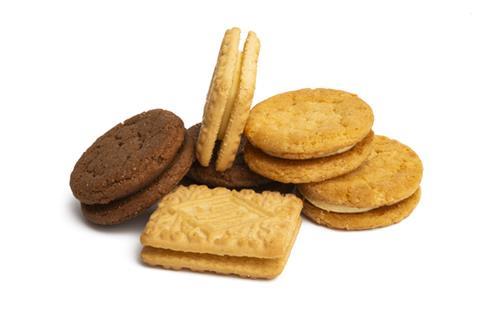
2. The total Everyday Treats sub-sector is up 27.4% YOY
As the cost-of-living crisis deepens it’s no surprise that customers are considering price when purchasing. Even in a relatively cheap category like cakes and biscuits, newly-thrifty shoppers are changing behaviour at the tills to match their budgets.
“Data has shown us that shoppers have reduced the number of packs they buy per trip (-2% to 2.2 packs on average) and are also opting for smaller packs year on year (-2% to 223g per pack on average) [Kantar],” says Colin Taylor, trade marketing director at Fox’s Burton’s Companies UK.
“We have also seen the strongest growth in biscuits in more affordable sectors like ‘Everyday Treats’ (£5.57 per Kg vs an average of £5.80) [Kantar].
This means putting the everyday segment to the fore in-store. Taylor maintains that Fox’s Favourites Crunch Creams [up 22% yoy], Paterson’s shortbread [up 17%] and Fox’s Favourites Jam N Cream [growing 29.8%] all fit the bill [NielsenIQ].
“We are working hard with retailers to ensure these favourites have visibility in store, attracting existing and new shoppers to the category,” she says.
For Stuart Cordner, from Cordners’s Spar in Belfast, value is becoming the primary driver in the category. “We’re looking at signposting value in everything we do across the store,” he says.
“People come in looking for something sweet – but they want to feel they get a deal too. At the minute it’s the deals we offer, and the more value end of the market, that are doing better for us.”
Sue believes that PMPs are the key to unlocking Everyday Treats right now.
“When people come into the store they don’t have a lot of time and we find that a price-marked pack helps them make that decision much more quickly and we’re able to shift a lot more [than non-PMP],” she says.
Sue also reckons own brand is all-important. She stocks the Bobby’s range of cakes and says that the range goes a lot faster than some of the more well-known lines – she also rates the quality.
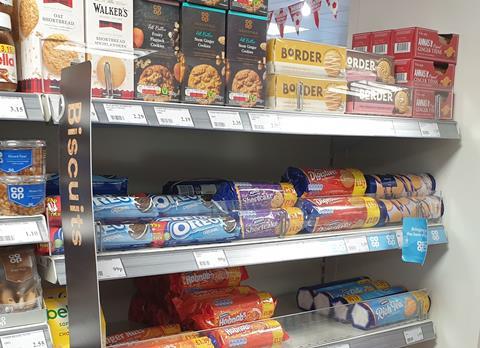
3. Biscuits are one of the most common victims of shrinkflation, say shoppers
Biccies may secure big sales in c-stores, but some of the packs have gotten smaller over the last year. That’s down to the shrinkflation effect as manufacturers look at ways to offset historically high input costs buoyed by stubborn levels of inflation. Or as Carol Saunders, head of insight at The Knowledge Bank puts it: “In the past year, price inflation has had a large influence on baked goods, with biscuits, both savoury and sweet impacted significantly.”
For example, in 2023 McVitie’s Digestives hit the headlines when the brand slashed packs from 400g to 360g – a 10% cut in size. Customers have apparently taken notice. A survey from consumer champions Which? revealed that one in five shoppers said they planned to switch from products that had been downsized by manufacturers to buying in bulk instead, with biscuits being highighted by consumers as one of the top three most common victims of shrinkflation.
However, what shoppers say they’ll do in the survey, and their actions when they’re fiending for sugar at 3pm, can be quite different.
“I think that customers have mainly just accepted it,” says Sue. “Overall people are not that savvy and they’re basing their decisions on the overall price point. They see they get a bigger pack for the same price [as a smaller pack] but don’t notice that they’re getting two or three fewer biscuits.”
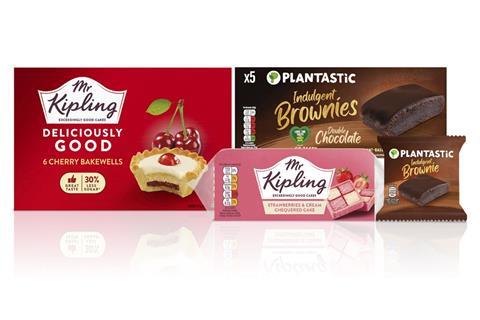
4. Healthier cake is worth £96m across all outlets
While for many it sounds like an oxymoron, healthier cake could be a sales winner if the economy finally gets the sugar rush it needs to grow.
“Moving further into 2024, as economic conditions improve, health will likely continue to be a profit-driver for producers, but until then value for money will be a priority for consumers,” says Saunders.
“Providing affordable products while marketing any additional health benefits your [products] offer has presented itself as the ideal combination.”
She adds that “Many global food trend agencies predict a growing demand for functional ingredients, with UK consumers being prompted by reduced sugar or healthy ingredients.”
For Premier Foods that’s meant investing in the plant-based category, which seen an average annual growth rate of 24% in value over the last three years (Circana).
“In 2023, Plantastic pivoted the strategy to refocus on delivering ultimate indulgence with Plantastic Millionaire Flapjacks and Plantastic Double Chocolate Brownies to provide consumers with even more choice of great tasting, indulgent, plant-based cake,” says Katherine Cook, Plantastic brand director at Premier Foods.
“The Plantastic cake portfolio delivers on an unmet category need for seriously tasty plant-based innovation.”
Elsewhere in the cake category, Cook states that loaf cakes are more likely to be chosen for health reasons versus total packaged cakes [Kantar].
To meet the market Mr Kipling expanded its Deliciously Good range in May 2023 with the launch of loaf cakes in Lemon and Caramel Apple flavours. The range promises 30% less sugar, real fruit and are 115 calories per portion.
Last year Mr Kipling also debuted its healthier Cherry Bakewells, with 30% less sugar in a recipe the brand promises “doesn’t compromise on taste”.
Meanwhile, might savoury biccies be due a health-related comeback? Saunders says that the growth of oatcakes could point the way forward for brand innovation.
“Seventy per cent of UK consumers find savoury biscuits made using healthy ingredients such as veg, grains, or pulses appealing [Mintel],” she says.
“In fact, Scotland has continued to overtrade on oatcakes, demonstrating a £3.7m value performance in the last year. This is primarily because public perceptions deem grains such as oats as a healthier alternative to traditional cream crackers.”
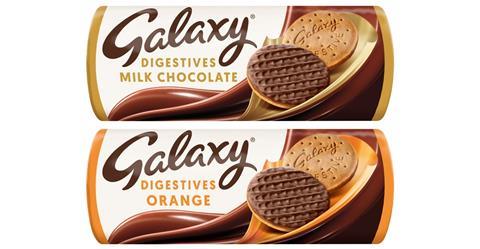
5. Premium Treat biscuits have risen 16% in the last year
Despite shoppers seeking value, the Premium Treat segment is still in growth across total retail, though it’s being lapped by everyday options.
“Shoppers in the UK have shown they see the value in biscuits, as we have seen in the growing ‘Premium Treat’ segment which is worth £297 million a year and growing +16% YoY [NielsenIQ and Kantar],” says Taylor.
“Shoppers are looking for an affordable luxury and biscuits provide an accessible treat.”
Michelle Frost, general manager at Mars Chocolate Drinks and Treats, says that Galaxy Digestives, which launched last year, are “strong contenders” in the category – contributing £3.9m [NielsenIQ and Kantar].
“With the Galaxy brand being bought by 50% of households in the UK [Kantar] consumers are looking to enjoy affordable treats with a premium taste,” she says.
“The strength of our brands and premium quality attract shoppers looking to enjoy those familiar flavours in a delicious biscuit format.”
Sue says that premium choices are important, but worries about prices creeping up. She’s seen wastage in more upmarket lines as they nudge past a price point that customers feel is accessible.
“I think the premium range is important to have and hopefully it’ll return if shoppers feel more confident this year,” says Stuart. “But right now it’s essential to get your value offer right, with price-marked packs and promotions.”




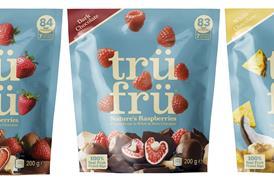


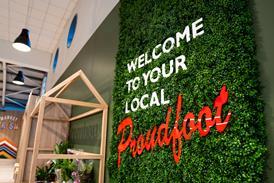
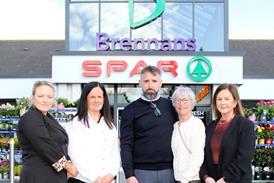


![WG-4003[58]](https://d2dyh47stel7w4.cloudfront.net/Pictures/274x183/4/5/1/353451_wg400358_6083.jpg)






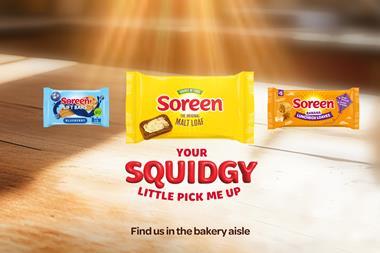
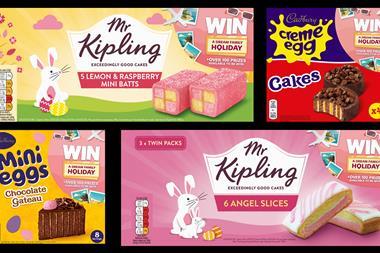
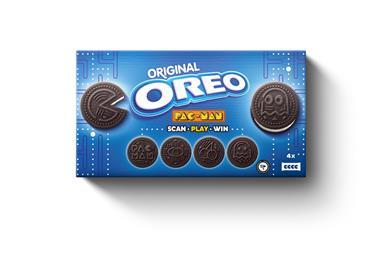
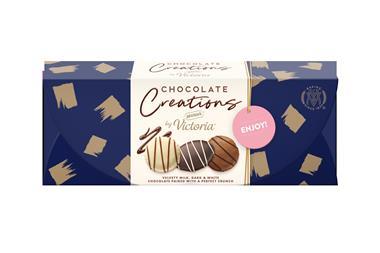
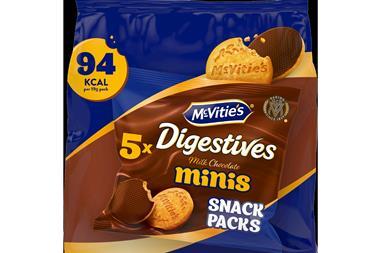






No comments yet